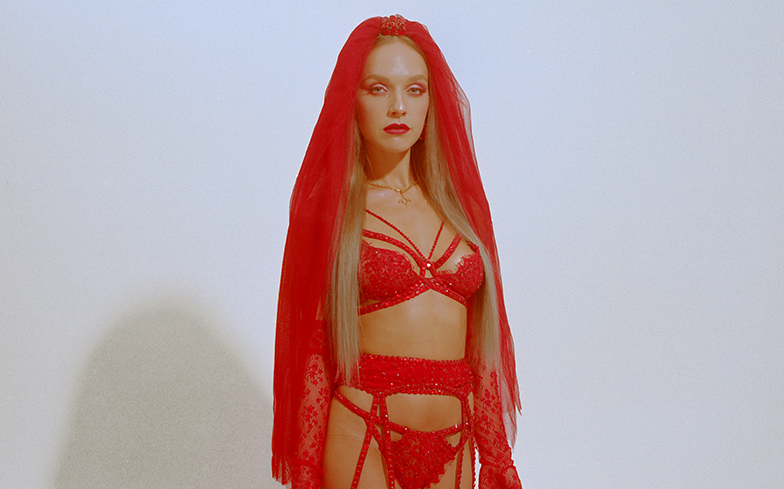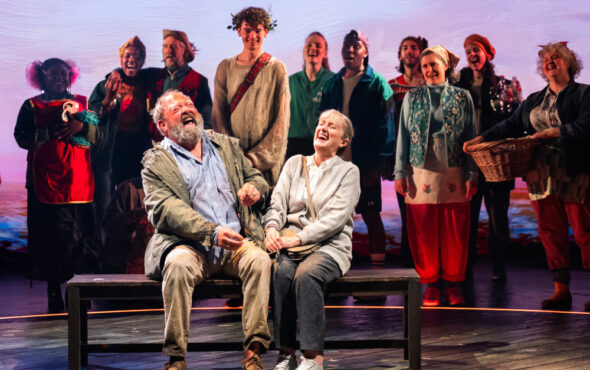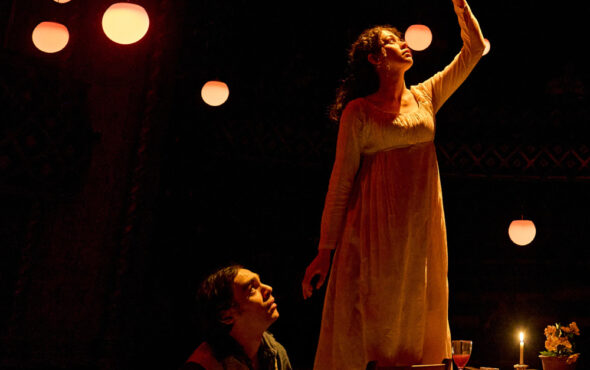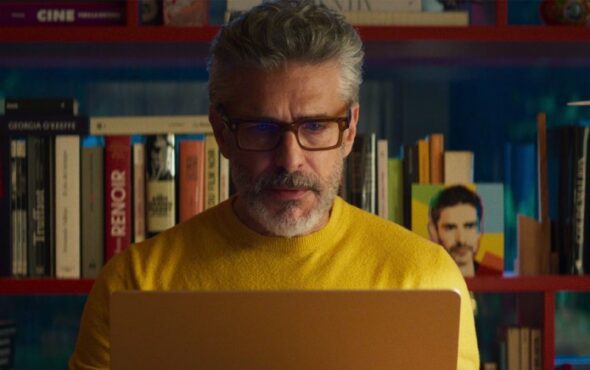
“I’m a feminist, lesbian woman and as an artist, I want to explore my experiences and write stories about them.”
Queer artists making queer music is a bit of a rarity isn’t it? Zolita, however, is one of the few LGBTQ artists who isn’t afraid to conquer the world of pop as an openly gay musician. “We need more queer, female perspectives in the media,” the American singer-songwriter tells us. “I’m a feminist, lesbian woman and as an artist, I want to explore my experiences and write stories about them.”
Zolita first gained her massive fanbase with the video release of her lesbian anthem, Explosion, which depicted the Californian-born artist as she yearns for more than just a friendship with her bff.
“People told me that it had helped them come out, and helped them tell their best friends their feelings,” she reveals. “Seeing that reaction definitely made me realise that this is what I’m supposed to be doing as Zolita, writing songs that disenfranchised people can see themselves in and relate to.”
We sat down with Zolita and discussed the importance of being a “feminist lesbian” in the music industry, her incredible new EP Sappho, and why it’s bad to manifest black magic and place hexes on people. Just the usual stuff, y’know?
You’ve got a really cool aesthetic. Who has influenced you as an artist?
A lot of other female pop artists. Lady Gaga inspires me a lot. I think living in New York inspires me a lot just because you see so many different kinds of people, and there’s such an incredible drag scene. All of the artists are working their asses off too, because you can’t just be in New York and skate by. Also, the people that work with me, like my stylists, they inspire me a lot.
Did you feel like you had to step your game up, living in New York?
Yeah, and it’s so expensive and it’s so hard to live there. You have to be working really really hard, and you have to want it really badly. I’m really glad that I lived there for six years, because it definitely gave me a really good work ethic. It’s easy to skate by in LA, so I’m glad I have the New York spirit in me.
Starting out in New York must’ve been quite beneficial for you as an artist.
Exactly. That’s how I feel. One more thing that influences me aesthetically is – I practice magic. That definitely shows up in a lot of my work.
That makes sense. Your music is very witch-pop.
Yeah exactly. The next single that I’m gonna release is peak witch-pop. It’s called Black Magic. Very excited about it.
Can you describe the sound for us?
It’s more trap, and clubby. I really love it. It’s super danceable, so I’m already thinking of how cool the choreography is gonna be in the video. It’s dark, and it’s cheeky. It’s funny because in my last video, New You, I went into it thinking I wanna hex the guy the girl cheated on me with, but then I realise, y’know, ‘Black magic is bad!’ I do believe that. I don’t believe in black magic personally, and I think it’s more productive to manifest for yourself, than to harm other people, but black magic definitely taps into that side of me that sometimes does want to put a hex on somebody, although I never have! [Laughs]
We’ve all wanted to at some point haven’t we?
Yes, yes, exactly.
You’re openly gay and unapologetically queer within your art. Do you mind telling us about your coming out journey?
I came out when I was 17. I knew that I was gay in senior year of high school, and before that, I just thought that I wasn’t interested in romance, and I wasn’t interested in love, I guess? It took me until senior year to figure that out, just because I didn’t see any gay woman who looked like me in the media, until I’d seen Glee. Once I saw Glee, and saw the Santana and Britney romance, it was such a huge moment for me, to see the representation of two lesbian femme women on TV. I was like, ‘Oh, that’s what I want’. I lived in a pretty liberal area in California, but still there wasn’t… I lived in a school of 2000 people and there was one token lesbian girl and one token gay guy, and I didn’t feel like it wasn’t necessary to come out there because I knew that I was going to college so soon, and I was going to NYU of all places. I knew I’d be accepted for who I am there. Once I left for college, I came out within a month of being there, and my roommate was queer too so that was lovely. I never had a huge sit down with my parents, and as an artist, I never had to come out as an artist because the music I was releasing was queer already.
Did you ever have any reservations entering the music industry as an openly gay woman?
Not at all actually. If anything, I thought that it would help me in some way, just because it helps me make art from a perspective that’s a little bit more fresh than anything that’s out there right now. I knew that was a huge void that needed to be filled. We need more queer, female perspectives in the media, so I had no reservations entering the music industry as an openly gay woman. Also, being in NYC helped a lot, just because being yourself is so encouraged. I never thought twice about being openly gay in the media.
You’re also unapologetically queer on your social media. What kind of feedback have you had from fans?
The first time I knew this was exactly what I am meant to be doing was when I put out Explosion, and that video went viral. This whole community formed in the comments based on shared experience of falling in love with your best friend as a queer person, as it’s such a universal experience. It happens to so many people. So many fans said, ‘Thank you so much, it was so healing for me’ and finding other people who had the same experience was really special. Some had the lyrics tattooed on them, and told me that it had helped them come out, and helped them tell their best friends their feelings. Seeing that reaction definitely made me realise that this is what I’m supposed to be doing as Zolita, writing songs that disenfranchised people can see themselves in and relate to. And I’m meant to be using female pronouns in my songs, so fans can feel like it’s especially made for them, instead of transposing their experiences onto straight songs, which we’ve done our whole lives. I don’t have a problem with that, music is so universal, but it’s also really lovely when a song can feel so specific to you. So yeah, feedback has been really nice, and on social media I’m super open about my relationship with my girlfriend, and people love that too because they can see the realness, and be hopeful about their relationships in the future.
Do you think that other artists with a platform like yours should be using their voice to promote equality?
Definitely. People like Kehlani and Hayley Kiyoko are probably the biggest queer female artists right now, and I think that they do a good job with their platforms.
Their video for What I Need is incredible.
Yeah, it’s so amazing. I love that they did that together.
They were quite outspoken recently towards Rita Ora’s new single Girls. What were your thoughts on that?
I remember being so excited about that song because there were so many fierce women on it, and when I heard it and the lyrics started sinking in, I had this huge ‘Oh god’ moment. Like, ‘This is so horrible’. I knew that I wanted to say something, but at first I was uncertain if I should because all their fans would probably come after me, as they’re all untouchable female pop stars. Then, I realised that building loyalty with my fans, and making them realise that it’s not okay, and validating their feelings, was way more important. So that morning I started tweeting about it, and I posted stuff on Instagram about it. Rita Ora, I don’t think she’s allowed to make a song like that yet because she hasn’t put in queer labour. I mean, she’s allowed to do it, but it’s not gonna be well received in 2018. Also, there weren’t any lyrics that were especially awful. It was everything surrounding the song, the context, the things she said about it, that she was inspired by I Kissed a Girl, which is the perfect example of males capitalising on the queer female experience. When Rita was asked if she was bisexual, she said she didn’t think it matters… It’s crazy to me that a song, like that, was written in 2018, and it was also written by five men and three women, and produced by five men, so that’s all the evidence you need I think. Also, it’s the people she chose to be on it. Cardi B isn’t super loved by the LGBTQ community because she’s said some pretty awful things in the past, and Bebe Rexha and Charli XCX have never said anything about their sexuality. Maybe if Rita Ora chose Hayley Kiyoko and Kehlani, it would be a way different story.
You’ve also been quite outspoken in the past in regards to female sexuality and feminism. How important are these topics for you to explore as an artist?
They’re everything to me. Female empowerment and talking about the queer experience is my identity. I’m a feminist, lesbian woman and as an artist, I want to explore my experiences and write stories about them. I have a platform and I wanna use it to inspire people and write stories that have not been written.
Spotify has completely changed the music industry, and now some artists decide to release EPs instead of full length albums. What are your plans for releasing future material?
I’m probably gonna do some more singles this summer and that will all lead to another EP. Then there’s a concept EP that I wanna do as well, that’s just a side thing. I’m not thinking of the full length album yet. I think I probably won’t do that until I have a little bit of a bigger platform, or I’m signed to a label. I think I’m gonna wait to do that until I have more resources because I do want the first album to be a visual album and be a whole film, basically. So I’m gonna wait on that one a little bit. I also want to wait until my sound is a little more fleshed out because I’m very sold on my aesthetic and my ability as a filmmaker, but I still feel as a music artist, I’m constantly finding new things. I think New You is a good indicator of where I want my sound to be, so I wanna keep going with that.
Unless you’re a massive established artist these days, it’s hard to put out a full length album.
Yeah, it doesn’t make sense to put out an album because you wanna stay relevant. Putting out singles every month is a great way to stay relevant and keep people excited. And you’re right about Spotify, it’s completely changed, like, you can be an independent artist and if you have Spotify on board with what you’re doing, then you’re gonna be fine. But it’s also getting harder to get Spotify support. With social media too, it’s just really nice that the middle man has gone and we have queer people and all kinds of people who can make art and put it out, and build their fanbase, despite what any label people have said.
Who would you love to work with in the music industry?
Justin Tranter. I love him so much. I just met him for the first time last week, and he’s so amazing and I admire his work. Who else? Lady Gaga, in any capacity, even if it was doing something visually for her. That would be incredible. Kehlani. She’s been doing so many features on other people’s tracks, and she steals every track she’s a part of and elevates it so much, so it would be really cool to work with her.
What can we expect from Zolita in the future?
More music videos, more frequently, and Black Magic! That’ll be coming out this summer. I’m excited because it’s dark, and it’s cheeky, and it’s unapologetically queer.
Zolita’s second EP Sappho – which features Fight Like a Girl and New You – is now available on iTunes and streaming services.





